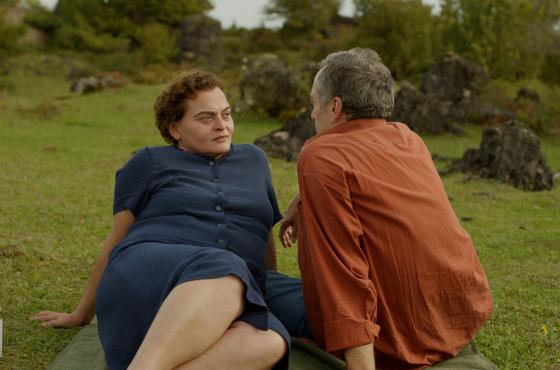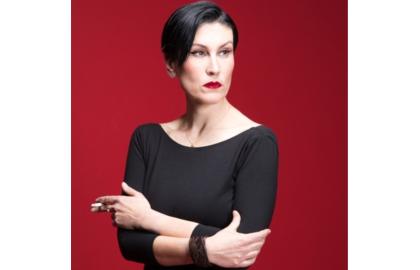After exploring feminist pornography in the 2000s, Ovidie (born Eloïse Delsart) went on to direct several television and radio documentaries and dramas, including Là où les putains n’existent pas[Everything’s Better Than a Hooker] in 2018 (Amnesty International Award for Best Documentary) and Des gens bien ordinaires [A Very Ordinary World] in 2023 (International Emmy for Best Miniseries). In her 2023 essay entitled La chair est triste hélas, Ovidie bares her decision to give up sex, initially out of sheer weariness and disappointment, and subsequently by conviction. She writes down everything she, in her own words, refuses to articulate. “There is a kind of violence that you end up regretting,” she writes, “but which you have to go through to find peace. This text is the fury that inflames and consumes me.” It reveals a spirit of disenchantment as taut as a bow, buoyed by a salutary frankness and near-cold anger.
You've been working on issues of intimacy and sexuality for a long time. Is that also the common thread throughout your work?
Ovidie: “I’ve been exploring the political dimension of intimacy for the past 25 years. How can intimacy be made into a political issue, which is becoming increasingly commonplace in today’s debates – particularly in the post-MeToo climate? I don’t necessarily refer to sex when I use the term intimacy, by the way. To me, the word intimacy covers relationships, love, parenthood, even childbirth. I try to give a political dimension to anything that takes place in the bedroom and the home in general.”
What are some of your influences?
Ovidie: “I was strongly influenced by the feminist pro-sex movement of the late 70s and early 80s when artists worked to introduce women into museums, as well as other campaigns for a better sex education. I also admired the work of some female performers, such as Cosey Fanni Tutti and her 1976 performance with used tampons at London’s Institute of Contemporary Arts. I’m captivated by all these women who used their bodies as a medium.”
The essay La chair est triste hélas broaches the subject of violence in the private sphere. Did you anticipate the violence your words might provoke? You wrote, “I also suspect that this story will incite violence and threats because men loathe women who reject them.”
Ovidie: “When I was out promoting the book, I declined all video interviews and TV show; I know how the media operates. Instead of focusing on hearing what a woman has to say, [people think] I’ll check her out first. We’re all guilty of that. La chair est triste speaks of giving up on sex, of a departure from heterosexuality. Inevitably, there will be two opposing sides. Some will say ‘what a shame, she’s still fit’, whilst others will say ‘she’s so ugly I wouldn’t even touch her with a barge pole.’ Either way, it sends the wrong message. So I focused on radio and print. Because the withdrawal from heterosexuality is not without consequences. It triggers visceral reactions in some men. These men have a capricious, childlike urge to possess all women. They go ballistic and become incredibly aggressive the minute a woman says, ‘I’m not accessible’, shutting the door on desire and approachability. That’s also how I explain lesbophobia and people’s aversion to the hijab.”
When considering today’s issues around relationships, where do you stand after giving up sex?
Ovidie: “We’re all scrabbling around, wondering if love isn’t at the root of all forms of discrimination and violence. Never before have we given so much time and thought to destroying the couple and attempting to rebuild something more egalitarian. It’s very much the zeitgeist. There’s something wrong, so we have to reinvent love. But we don’t exactly know how to reconstruct. I’ve spent years deconstructing, but I still can’t see the end of the reconstruction process. I feel we’re in a minefield. I have a feeling that it will take years to reconstruct models that work for us. Or, otherwise, we’ll go back to the couple as it was before. Absolutely nothing will have changed. We’re currently entering an experimental stage.”
Do you think that the notion of family is also being reassessed?
Ovidie: “How can we create a different type of family today? Lots of people around me propose an alternative parental structure. All my dyke and gay friends have given this a lot of thought. There was a time when children were the fruit of love. Nowadays, we have to think about how to conceive a child and how to raise it, irrespective of any disagreement over the issues around love. We have come to realise that the couple as we know it – and the parenthood associated with that couple – doesn’t work. Within a child’s first three years, the couple breaks up, lawyers are called in and, eventually, everyone is unhappy. This demonstrates that something isn’t working properly, but I don’t have a solution.”
Are you exploring new relationships or new avenues of commitment?
Ovidie: “As far as I’m concerned, I prefer to shut myself away completely from everything involving love and desire. I’ve chosen desertion. I’m not trying to rebuild anything. But you know what: friendship is underrated. Once you break away from issues around sex and, more generally, heterosexuality, something becomes blatantly obvious. You suddenly start losing contact with some of the people around you. It feels like a slap in the face. The first one. When you start showing signs that you’re inaccessible, many people around you – even those who didn’t especially want to fuck you – start behaving differently. Unbeknownst to us, there was probably a hint of flirtation in those interactions, a bit of affectation. People don’t give a shit that you have a boyfriend, it seems – it won’t stop them from fantasising. But not wanting sex!? So that’s the first phase of the skimming process.”
You don’t provide alternative models or paths to follow – for yourself or others. Do you feel lonely?
Ovidie: “No, I’m not lonely. For a start, I have a daughter. And I don’t live on my own, I have three dogs. Dogs and women have forged a unique bond founded on empathy. Historically, dogs were assigned to domesticity and menial tasks, which meant working with women in the home. This form of household duty led to a unique relationship. More than just a ‘hunting tool’, dogs became social partners very early on, especially with women. The image of the crazy cat lady dying all alone immediately springs to mind, but I’m never alone. I’m always with someone – one way or another. I’ve never had somebody by my side 24/7 but I’ve always had someone by my side. I don’t feel alone. We’ve constantly been told that we should always put love first and that girlfriends come second. Once we break free of this pressure to be in a relationship, we realise that we have much more mental space, and consequently more time to dedicate to our friends.”
Safia Kessas
On 25 November, as part of Meet the Thinker, Ovidie will continue this conversation with Safia Kessas at the Henry Le Boeuf Hall.



